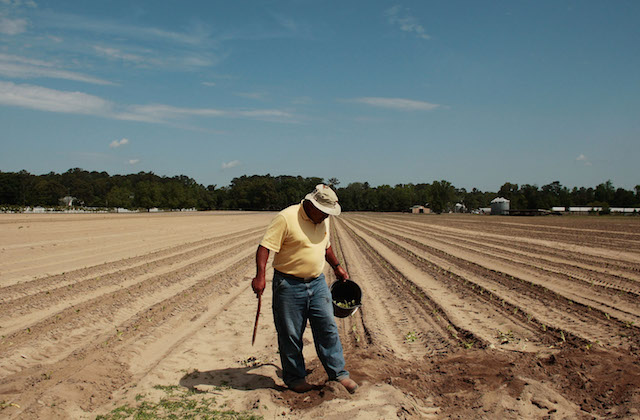Now that the rain from Hurricane Florence has stopped, North and South Carolina have begun assessing the extent of the damage. One group that has been significantly impacted by the storm—and which has little opportunity to receive recovery assistance—is migrant farmers.
Hurricane Florence made landfall on September 14 in North Carolina before moving to South Carolina. It dumped dozens of inches of rain and caused at least 43 deaths; many counties remain under flood watch nearly two weeks after the storm. A September 25 article from The Guardian investigates the plight of farm workers in the region. Per The Guardian:
rnt
In North Carolina, 75 percent of the cash crops are grown in the eastern part of the state, where the flooding has been the most severe. An estimated 150,000-plus farmworkers pick these crops, often by hand: Most are immigrants or migrant laborers from Central America, and around half are undocumented. Their jobs are already plagued by uncertainty, and now Hurricane Florence could thwart what is usually the most lucrative time of the year.
North Carolina is the country’s largest producer of sweet potatoes, and countless crops have been destroyed. “They are under feet of water—not just one foot, but under multiple feet,” Melissa Bailey Castillo, who works with migrant workers at the Kinston Community Health Center in Kinston, North Carolina, told The Guardian.
Farmers were pulled from the field five days before the storm hit, meaning it has been close to three weeks without paid work for many. “Finding work is going to be really difficult for the families we serve,” Patty Kingery of the East Coast Migrant Head Start Project told The Guardian. “We have a lot of families who will not have work for the remainder of the season, while the more mobile families are going to seek work elsewhere.”
With a reported average annual income of just $16,000, according to Legal Aid of North Carolina, workers face a dire situation when Florence’s waters finally recede.
Aside from not having work, many migrant laborers will also need to find housing that was not damaged by the storm. While others in the state who need shelter have the option of applying for assistance from the Federal Emergency Management Agency (FEMA), many farmers of undocumented status will not turn to a government agency for fear of deportation. Says The Guardian:
rnt
As they go about rebuilding their lives, undocumented workers are reliant on the aid of organizations, since they are often reluctant to seek government assistance to repair their homes.
t
The uptick in immigrant enforcement under Donald Trump has also led workers without legal documentation to question whether to head to a shelter or to seek help at all. Before the storm hit, a Federal Emergency Management Agency administrator said in a news conference that the agency could not “guarantee” that immigrants in shelters wouldn’t be detained and handed off to Immigration and Customs Enforcement authorities.
